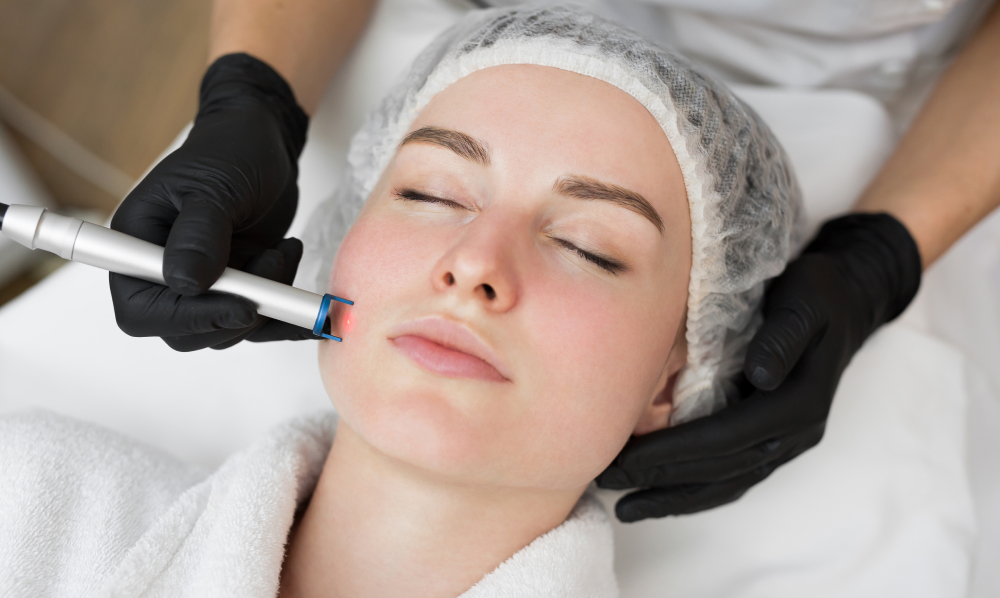What Is Microneedling?
Microneedling, also known as collagen induction therapy, is a cosmetic procedure that has gained popularity for its effectiveness in treating various skin conditions and improving overall skin appearance. This minimally invasive treatment involves using fine needles to create tiny punctures in the top layer of the skin. Let’s explore the details of microneedling:
- Understanding Microneedling
- Basic Principle: Involves using fine needles to create controlled micro-injuries on the skin, which triggers the body’s natural wound healing process.
- Collagen Production: The healing process increases collagen and elastin production, which is essential for skin rejuvenation.
- Versatility: Can be used on various body parts, most commonly on the face.
- The Therapy Process
- Initial Consultation: This involves assessing the patient’s skin condition and discussing treatment goals.
- Customized Treatment Plan: Based on individual skin needs and concerns.
- Procedure Preparation: The skin is cleansed, and a topical anesthetic may be applied beforehand to minimize discomfort.
- Procedure and Techniques
- Microneedling Device: A specialized tool, often a derma roller or pen-like device, creates tiny punctures in the skin.
- Application: The device is rolled or moved over the skin, focusing on target areas.
- Duration and Sessions: Each session may last about 30 minutes, with multiple sessions recommended for optimal results.
- Benefits of Microneedling
- Skin Texture Improvement: Reduces the appearance of scars, wrinkles, and large pores.
- Enhanced Skin Tone: This can improve hyperpigmentation and uneven skin tone.
- Acne Treatment: Helps in reducing acne scars.
- Product Absorption: Increases the efficacy of topical treatments by enhancing their absorption into the skin.
- Risks and Side Effects
- Redness and Irritation: Common immediately after the procedure.
- Risk of Infection: If not performed in a sterile environment or aftercare instructions are not followed.
- Temporary Swelling and Bruising: Might occur, depending on the skin’s sensitivity.
- Who Should Be Cautious
- Those with Active Skin Infections: Like acne or herpes.
- Individuals with Certain Skin Conditions: Such as eczema or rosacea.
- Pregnant Women: Generally advised to avoid microneedling during pregnancy.
- Finding a Qualified Practitioner
- Professional Qualifications: Look for licensed dermatologists or trained skincare professionals.
- Experience: Experienced practitioners can accurately assess skin types and needs.
- Hygienic Practices: Ensure the clinic maintains high standards of hygiene.
- Consultation: A detailed consultation should be provided to understand the procedure and potential risks.
- Conclusion
Microneedling offers a promising solution for various skin concerns, utilizing the body’s natural healing mechanisms to rejuvenate and repair the skin. While it’s generally safe, choosing a qualified and experienced practitioner is crucial for effective and safe treatment.
This comprehensive overview of microneedling covers its methodology, benefits, potential risks, and the importance of seeking treatment from qualified professionals, highlighting its role in modern cosmetic skin care.
Conditions Treated
- Pain Conditions: Musculoskeletal Pain (back, neck, knee, shoulder, elbow, etc.), Arthritis, Migraines, Headaches, Sports Injuries, Fibromyalgia, TMJ, Post-Operative Recovery, Nervous System Disorders.
- Respiratory Disorders: Asthma, Allergies, Sinus Problems.
- Gastrointestinal Disorders: Irritable Bowel Syndrome, Food Allergies, Ulcers, Gastritis, Acid Reflux, Indigestion, Constipation/Diarrhea.
- Women’s Health: Infertility, PMS, Menstrual Irregularities, Endometriosis, Poly Cystic Ovarian Syndrome, Menopause, Hormonal Imbalances, Pregnancy Conditions, Postpartum, Reproductive Disorders, Breech Baby.
- Men’s Health: Incontinence, Reproductive Disorders, Prostate Problems.
- Children’s Health: Coughs, Colic, Allergies, ADD/ADHD, Sleep Disorders, Digestive Problems, Fever/Flu/Colds, Stomach Aches/Nausea, Headaches, Bed Wetting.
- Addictions: Smoking, Cravings, Drug, Alcohol.
- Mental/Emotional: Depression, Anxiety, Insomnia, Sleep Disturbances, Stress.


